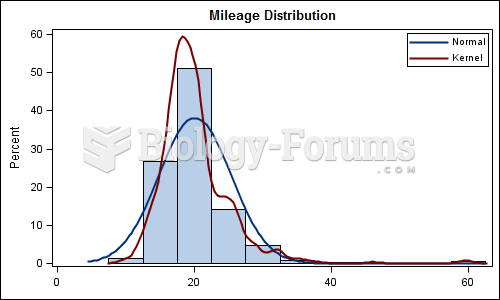This topic contains a solution. Click here to go to the answer
|
|
|
Did you know?
As many as 28% of hospitalized patients requiring mechanical ventilators to help them breathe (for more than 48 hours) will develop ventilator-associated pneumonia. Current therapy involves intravenous antibiotics, but new antibiotics that can be inhaled (and more directly treat the infection) are being developed.
Did you know?
Your heart beats over 36 million times a year.
Did you know?
In 2012, nearly 24 milliion Americans, aged 12 and older, had abused an illicit drug, according to the National Institute on Drug Abuse (NIDA).
Did you know?
In 1844, Charles Goodyear obtained the first patent for a rubber condom.
Did you know?
The horizontal fraction bar was introduced by the Arabs.







